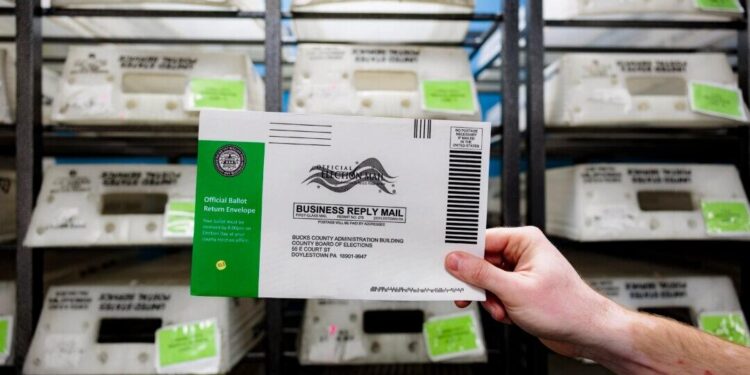Voters increasingly face the prospect of waiting beyond Election Day to learn who their next president will be.
Experts suggest that Georgia, one of the key battleground states, could potentially be called as early as midnight. However, states like Pennsylvania and Wisconsin are expected to experience delays that may extend beyond the official voting date. Complicating factors, such as hurricanes in the Southeast, could also impact the process.
“This really is an ‘expect the unexpected’ sort of situation this time,” said Michael Hanmer, director of the Center for Democracy and Civic Engagement at the University of Maryland.
“Patience is going to be crucial for ensuring that election officials can conduct the process properly,” he added.
Below are the states where voters are most likely to see delays after Election Day:
Pennsylvania
Pennsylvania has become a familiar point of delay for voters, particularly after President Biden’s victory over former President Trump was declared days after the 2020 election.
The tight race between Trump and Vice President Harris in Pennsylvania this cycle suggests another extended waiting period. One key issue is the state’s relatively new “early in-person” voting option, which functions similarly to absentee voting. These ballots, along with mail-in ballots, “will take some time,” noted David Becker, an election lawyer and co-founder of the Center for Election and Innovation Research.
“Pennsylvania has only had early absentee and no-excuse mail voting since 2020,” he said, calling it “a fairly recent development.”
Becker explained that election workers in Pennsylvania are expected to work continuously, releasing results in batches to maintain transparency. Trump’s focus on Biden’s birthplace of Scranton further scrutinizes the process.
“If it’s really close and there’s a lot of mail ballots, it could take some time,” Becker said.
Wisconsin
In Wisconsin, mail-in voting is available between October 22 and November 3, offering voters flexibility. However, this extended window has its own challenges.
While many ballots will be in officials’ possession before Election Day, state law prohibits counting or processing them until November 5. This delay could impact the speed of results.
“Wisconsin and Pennsylvania among swing states are the exceptions,” said Becker. “They can’t begin processing those ballots until Election Day. That’s going to result in some delays.”
Derek Tisler, an attorney at the Brennan Center for Justice, noted that Wisconsin officials have “begged” their legislature to allow ballot preprocessing. Until then, voters should prepare for slower timelines, though Tisler emphasized that these steps ensure accuracy and security.
Arizona
In Arizona, the state allows election officials to start processing ballots early, but the expected flood of mail-in ballots on November 5 could slow things down.
“Generous” provisions for early processing still won’t keep up with the volume of ballots expected on Election Day, said Rachel Orey, director of the Bipartisan Policy Center’s Elections Project. As a result, Arizona might end up being “the one we’re ultimately waiting for,” according to Lonna Atkeson, a professor at Florida State University.
According to Decision Desk HQ and The Hill, the margins between Harris and Trump in Arizona, Pennsylvania, and Wisconsin are razor-thin. This close competition could make it difficult to declare a winner quickly.
“My crystal ball is, of course, going to be cloudy depending on how clear a picture we have on the competitiveness of the race,” said Paul Gronke, director of the Early Voting Information Center at Reed College.
“If the race is extremely close, it’s going to be pretty opaque, and it may be quite a while until we get clarity on the results,” said Paul Gronke, director of Reed College’s Early Voting Information Center.
North Carolina
The 2020 election saw delays in North Carolina due to the pandemic, and this year, Hurricane Helene adds another layer of unpredictability.
Although experts expect slightly fewer mail-in ballots than in 2020, early voting trends are still difficult to predict. The storm damage in western North Carolina could further complicate the counting process, but election officials remain committed to ensuring that all ballots are verified and processed.
“The state is ‘a big question mark,’” said Becker. Election officials in the affected areas may struggle with resources, adding to potential delays.
“We’ve all got to have some grace with how long it might take them,” Becker added.
Nevada
Although Biden won by about 3 percentage points in 2020 in Nevada, the state’s mail-in voting system could extend the vote count.
Both Harris and Trump are campaigning aggressively in Nevada. Harris’s running mate, Minnesota Gov. Tim Walz, recently campaigned in Reno, while Trump plans a rally in the same city later this week.
“Nevada might be into Wednesday,” Becker predicted.
Adding to the timing issue, Nevada’s and Arizona’s polls close later than East Coast states like Pennsylvania and North Carolina, further delaying the announcement of results.
Georgia
Georgia, a critical swing state for both campaigns, could provide some optimism in terms of timing. Experts expect Georgia to report results earlier than most other battlegrounds.
“Georgia’s probably going to be the first one of the swing states to be called, barring an incredibly narrow margin,” Becker said.
“They have very good policies in place. They’re going to have a lot of early voting and in-person voting. The percentage of mail ballots in Georgia will probably drop back down to about 10 percent give or take. And they will preprocess them.”
“I think we will have a pretty good reporting from Georgia by maybe midnight on election night,” he said.
The state has implemented strong early voting policies and expects fewer mail ballots than the previous election. With effective preprocessing, experts suggest Georgia could deliver results as early as midnight on Election Day.







